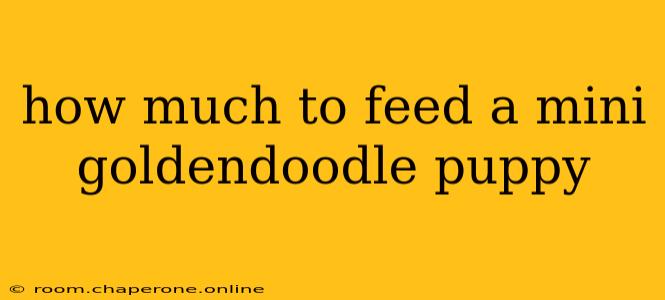Bringing home a mini Goldendoodle puppy is incredibly exciting! These adorable fluffballs are known for their playful personalities and loving nature. However, responsible puppy ownership includes understanding their nutritional needs. Getting the feeding amount right is crucial for their healthy growth and development. This guide will help you determine how much to feed your mini Goldendoodle puppy, covering everything from puppy food selection to feeding schedules and potential problems.
Choosing the Right Food for Your Mini Goldendoodle Puppy
Before we dive into feeding amounts, selecting the appropriate puppy food is paramount. Look for foods specifically formulated for small breed puppies. These are designed to meet the unique nutritional requirements of smaller dogs, often containing higher levels of calcium and phosphorus for healthy bone development. Key things to consider include:
- Breed-Specific Formulas: While not always necessary, some brands offer formulas tailored to the needs of Goldendoodles or similar breeds, considering their potential allergies and sensitivities.
- High-Quality Ingredients: Opt for foods with real meat and poultry as the primary ingredients, avoiding fillers like corn, wheat, or soy, which can be difficult for some puppies to digest.
- Age-Appropriate Nutrition: Ensure the food is labeled for puppies, as adult dog food doesn't provide the necessary nutrients for optimal growth.
- Protein and Fat Content: Puppies need higher protein and fat levels than adult dogs to support their rapid growth.
Determining the Right Feeding Amount for Your Mini Goldendoodle Puppy
There's no one-size-fits-all answer to how much to feed your mini Goldendoodle puppy. The amount will vary based on several factors:
- Puppy's Weight: The most crucial factor is your puppy's current weight. The food package will usually provide feeding guidelines based on weight. Start with the recommended amount for your puppy's weight and adjust as needed.
- Puppy's Activity Level: A highly active puppy will require more calories than a less active one.
- Puppy's Metabolism: Some puppies have faster metabolisms than others.
- Food Type: The calorie density of the food will influence the amount you need to feed. Dry kibble generally has a higher calorie density than wet food.
Using the Food Package as a Guideline: Most puppy food bags provide feeding charts based on weight and age. This is an excellent starting point, but remember, it's just a guideline. Regularly monitor your puppy's weight and adjust the food amount accordingly.
Visual Assessment: Don't solely rely on the feeding chart. Observe your puppy's body condition. You should be able to feel their ribs easily without excessive pressure. If they're too thin, increase the food; if they're overweight, reduce it.
Frequency of Feeding: Mini Goldendoodle puppies typically need to be fed several times a day. A common schedule is three to four meals a day for puppies under 6 months old, gradually reducing to two meals per day as they get older.
Monitoring Your Mini Goldendoodle Puppy's Growth and Health
Regular monitoring is key. Weigh your puppy weekly to track their growth. If you notice significant weight gain or loss, consult your veterinarian. Also, watch for signs of digestive upset, such as vomiting or diarrhea, which could indicate a problem with the food or feeding amount.
Veterinary Advice: Always consult your veterinarian for personalized advice on feeding your mini Goldendoodle puppy. They can assess your puppy's individual needs and recommend the best feeding plan.
Potential Problems and Solutions
- Overfeeding: Leads to obesity, which can cause joint problems, diabetes, and other health issues.
- Underfeeding: Results in stunted growth and malnutrition.
- Food Allergies: Symptoms include itching, skin problems, and digestive upset. If you suspect an allergy, consult your vet to determine the allergen and switch to a hypoallergenic food.
By carefully considering these factors and monitoring your puppy's health, you can ensure your mini Goldendoodle receives the proper nutrition for a happy and healthy life. Remember, consistency and observation are your best tools for successful puppy feeding.

